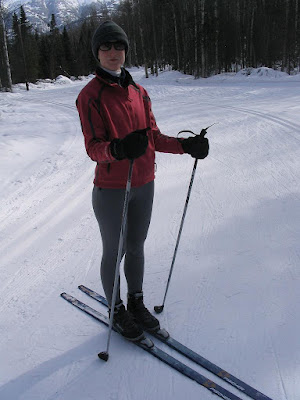
This is such a great story that I had to add it to my Blog. All dog lovers will understand the tears.
Jay
~~~~~~~~~~~~~~~~~~~~~~~~~~~~~~~~~~~~~~~~~~~~~~~
Zorro didn't finish, but he left his mark
STUD: Mackey's faithful canine friend is sick with pneumonia but is improving.By KEVIN KLOTT
Anchorage Daily News
Published: March 15, 2007
NOME -- Tears of joy rolled down Lance Mackey's leathery cheeks when he crossed the Burled Arch here Tuesday night to celebrate a historic finish in the Iditarod Trail Sled Dog Race.
But earlier in the day, 77 miles up the trail, an emotional Mackey shed tears of sadness when he dropped the always-faithful Zorro in White Mountain.
The 8-year-old team dog, father of seven of the eight dogs in this extraordinary team and the main stud in Mackey's Comeback Kennel, couldn't make the final push to Nome. Veterinarians thought Zorro had pneumonia; blood tests confirmed it.
"He's all I thought about," Mackey said. "Pretty hard to accept the fact that I might not see him alive again. It might sound silly, but I'd give up that new truck to keep Zorro alive. That's how important he is to me."
Mile after mile, the 36-year-old Fairbanks musher kept telling some higher being in doggie heaven, "Please, just keep my dog alive, man. He's the reason I'm here," Mackey said. "My main boy, no doubt about it."
After crossing the Burled Arch in Nome, one of the first questions Mackey asked Iditarod officials was, "How's Zorro?" Iditarod head veterinarian Stu Nelson said his health is improving, but Mackey won't put Zorro in the clear for another few days.
"It's not over," Mackey said. "This is the kind of situation that in four days from now he could still pass."
On Wednesday, Zorro was sleeping comfortably on a bed of straw inside a tent and away from his teammates. When Mackey entered, however, Zorro's eyes popped open and his tail started wagging fast.
"You'll be just fine, buddy," Mackey said. "He seems to be doing a lot better."
Much better than early Tuesday morning when Mackey checked into White Mountain -- the second-to-last checkpoint -- at 1:38 a.m. Mackey said Zorro seemed fine that day. But Mike Gascoigne, a volunteer veterinarian from Brisbane, Australia, noticed Zorro's belly bulging under the straw.
"That wasn't right," Mackey said of Zorro's hard breathing. "He was the only dog doing it."
So Gascoigne took Zorro into the warm checkpoint, checked his vitals and watched him until Mackey left for Nome at 9:38 a.m.
"To me, that guy deserves an award," Mackey said. "He sat on that chair all night, falling asleep sometimes. He never left (Zorro). It made me feel good that these guys are very adamant about saving dogs' lives."
When Mackey finished his first Iditarod in 2001, Zorro was his strongest dog. The only yearling (less than 2 years old) finisher, Mackey predicted Zorro would provide the bloodline for an eventual championship team.
"He ain't a leader, but he's the main reason this team is what they are," Mackey said. "Without him, I'm nothing. In 2001 ... I told my brother (Rick Mackey), 'He ate, he had a good attitude, his feet were perfect -- he's just an all-around dog.' "
With Zorro, Mackey built his kennel. The hard part was training the dogs to buy into his "eat more, rest less," philosophy. "I demand perfection," he said. "I think they read off me a bit."
Mackey reads their mannerisms, too. He said Zorro has a couple of sons in the dog yard trying to take his spot as the kennel's main stud.
"The whole kennel watches (Zorro) as soon as a bitch comes in heat," Mackey said. "He's the man. But his boy Molson wants that spot. He wants a taste of that action."
He can't run Zorro and Molson together. They fight like cats and dogs, he said, because he wants daddy's spot.
"I think it's comical," he said. "I can tell what they're thinking. One ready to brawl; one telling the other to (back) off."
 Going up the Buck Hollow trail, Shenandoah NP
Going up the Buck Hollow trail, Shenandoah NP On the way back down the Buck Ridge trail.
On the way back down the Buck Ridge trail. A VERY steep and rocky last 1/2 mile of the Buck Ridge trail
A VERY steep and rocky last 1/2 mile of the Buck Ridge trail 




























 "You have need of endurance,
"You have need of endurance, 
















